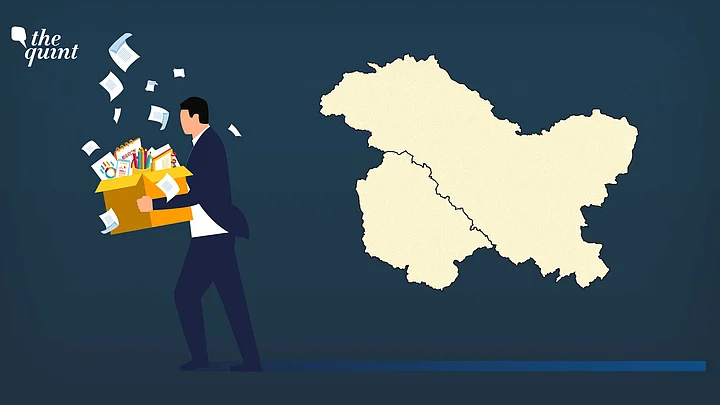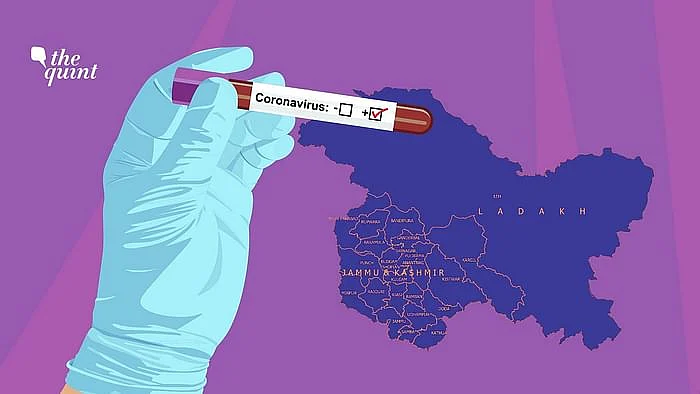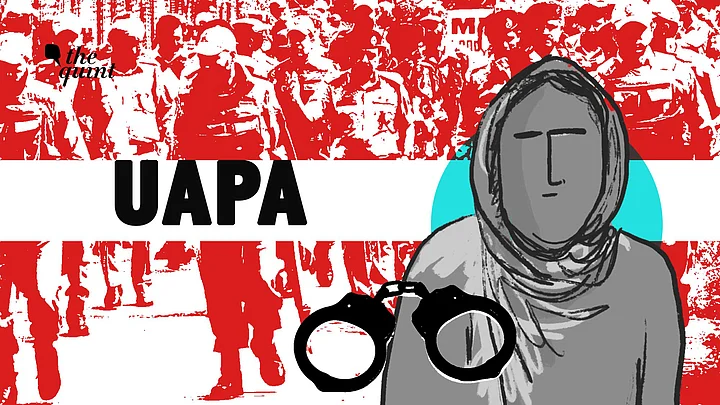“The world is preparing for Eid, but my family and I are mourning and preparing for the worst,” said Idrees Jan Mir, a sacked government schoolteacher.
Mir (39) of Kralpora Kupwara in north Kashmir became the first government employee in the Union Territory of Jammu and Kashmir to be terminated by Lieutenant Governor Manoj Sinha for being a “threat to national security”.
While narrating how he was sacked, Mir told The Quint that he had received a call on 1 May at 11 am from the local zonal education officer of Kralpora who ordered him to stay at home as some officials were heading towards his residence.
“All of this happened within hours. Firstly, a cordon was laid at my house by security forces. Then, some revenue officials gave a yellow envelope to me in front of police and officials of civil administration. As I opened the envelope and read the document, I was stunned and I felt as if the sky had fallen on me. I reached home and found my family crying. If I had not been a believer of God (Allah), I along with my family would have died by suicide,” lamented Mir.
‘How Can a Teacher Become Threat to National Security?’
He questioned how a teacher, who is a nation-builder, can suddenly become a threat to national security.
“I have been teaching hundreds of students and this move has left me humiliated. These grave charges against me will never allow anyone to hire me. My only demand is that I should be given a chance to explain myself regarding this order,” he added.
Mir lives with his wife, 11-year-old twin daughters, and a four-year-old son.
In the 1990s, his uncle Ali Mohammad Mir, also a government teacher, was allegedly picked up by the Border Security Forces (BSF) from outside the gate of his school, after which he was never seen again.
In 2007, Mir was appointed in the school education department.
However, during the 2016 Burhan agitation, he admitted, he was booked under Public Safety Act (PSA) for stone-pelting and was lodged at Kot Bhalwal jail for four months.
“I was jailed without any evidence for allegedly being involved in stone-pelting or protests. Somehow, the court quashed my PSA and, since then, I was living my life peacefully.”Idrees Jan Mir, a sacked government school teacher.
Families in Shock After Sacking of Employees
The dismissals have shocked the employees and their families as they refute the government’s claims terming them as unexpected and unwarranted.
Mir is among the three employees sacked last week by the J&K administration.
Within just two weeks, three different orders were issued by the general administration department of the J&K government, dismissing Mir, followed by Nazir Ahmad Wani, Naib Tehsildar of south Kashmir’s Pulwama district, and Bari Naik, an assistant professor of Geography at Government Degree College (women), Udhampur.
Article 311(2) (C) of the Constitution gives the administration powers to terminate the services of a government employee without constituting an enquiry against the person.
While Article 311(2) says no government employee shall be dismissed or removed or reduced in rank except after an inquiry, the sub section (C) says that this clause shall not apply where the President or the Governor, as the case may be, is satisfied that in the interest of the security of the state, it is not expedient to hold such an enquiry.
However, the government orders said that the Lieutenant Governor, Manoj Sinha, had considered the ‘facts and circumstances’ of the cases to conclude that the alleged activities these of individuals warranted dismissal from service.
Another Sacked Employee Was Held in 2020 on Charge of Helping Militants
Nazir Ahmad Wani, a Naib Tehsildar from Pulwama, was the second government employee who was dismissed from the service. In May 2020, Wani was arrested on charges of aiding militants and is currently languishing in the Central Jail in Srinagar.
The police had claimed to have found a hideout in his shop, which was, however, rejected by Wani’s family.
“In April last year, a written complaint to the Pulwama Deputy Commissioner was submitted by Wani, wherein he wrote that he was stopped and his driver was assaulted by the police in Pulwama. Subsequently, a search operation was launched in one of Wani’s pesticides shops. We were shocked to see forces claim that they had recovered ammunition and arms from the shop, which was baseless. This all happened because my brother filed a complaint with the DC against the police,” Wani’s younger brother Farooq Ahmad told The Quint.
Third Sacked Employee Held for ‘Radicalisation’ of Youth
The government also dismissed Assistant Professor of Geography Dr Abdul Bari Naik, who was posted at Government Degree College for Women in Udhampur for his activities, which were allegedly against the interest of the security of the state.
Naik, hailing from village Chidder in Kulgam district, was arrested in March this year for “radicalisation” of local youth in the district.
Last year, when the pandemic was raging, he supervised one of the three quarantine centres in Kashmir’s Kulgam district.
However, three FIRs namely 49/2018, 191/2018 and 20/2019 were registered against Dr Naik at Kulgam Police Station under Unlawful Activities Prevention Act and other sections, including 153, 353, 505 and 506 of the RPC while one FIR No. 85/2018 under Sections 153 and 506 RPC was registered at Qaimoh Police Station in Kulgam.
His former colleagues said that Naik had been arrested because of his activism.
“He has been exposing corruption in the government as well as encroachment of village land by the Indian Army, which landed him in trouble,” said one of his former colleagues.
Fear & Anxiety Loom Large Over Employees
The families of terminated employees are now urging LG administration to revoke the order and re-engage the employees in their respective positions.
The move of terminating employees has also triggered fear and anxiety among the present employees working with the UT government.
Shabir Ahmad, who works in Jammu and Kashmir’s Department of Consumer Affairs and Public Distribution department, has deleted all social media accounts after the government recently sacked three employees for anti-national activities.
“It is time to say goodbye to social media as the government is keeping an eye on employees. A simple post on social media can cost me my job. I cannot afford to lose it,” said 33-year-old Shabir of south Kashmir who was recruited as a non-gazzetted rank employee in 2016.
He added that some of his colleagues who were active on social media had deleted the posts that are contrary to the government’s policies and actions.
‘We’re on a Social Media-Filtering Spree’
A recently recruited lecturer teaching political science in Pulwama told The Quint that the move of terminating employees has given them psychological shock.
“We are on a social media-filtering spree these days. The government’s move of terminating employees has left us frustrated and now we cannot even question or criticise the government’s policy. The employees have become quiet and no one is debating the move even in private WhatsApp groups.”A 36-year-old lecturer who spoke on the condition of anonymity.
He added that no one will risk their job by challenging this move. “There is no accountability or justice on the ongoing COVID-19 pandemic, economic crisis and rising unemployment. There is a lack of accountability,” he said.
In April, the J&K government headed by L-G Sinha set up a Special Task Force to “scrutinise cases of employees suspected of activities requiring action under Article 311(2) (C), to complete the record of such employees and to refer it to a committee constituted by the government to engage with the other members of the Terror Monitoring Group (TMG)”.
Reacting to the formation of STF, Habeel Iqbal, a lawyer based in south Kashmir wrote on Twitter: “J&K Government constitutes Special Task Force. No. Not to deal with #COVIDEmergency2021 But to hunt down employees who work against the security of State. What priorities! (sic)”
Govt Should Focus on Saving Lives: Mufti
The move of sacking employees was also castigated by mainstream political leaders, including Mehbooba Mufti.
Taking to Twitter, she said: “In the middle of a pandemic, GOI should focus on saving lives instead of firing govt employees on flimsy grounds in Kashmir.(sic)”
Some even believe that the sacking move is another plot by the government to change the demography of J&K by dismissing local employees and recruiting non-local employees.
“These tactics are being done by the government to alter the demography of J&K. Last year, domicile laws were introduced to convert J&K Muslim-majority state into Hindu state. This has started ever since Article 370 was abrogated in August 2019,” said Samiullah, a post-graduate Kashmir university student.
Such dismissals had occurred even in the 1990s when armed militancy and separatism were at peak in Kashmir.
Under Article 126 of J&K Constitution, the state government had dismissed employees from time to time. During the 2016 political unrest that was triggered after Hizbul commander Burhan Wani’s death, as many as 12 government employees were dismissed over charges of spearheading and participating in anti-India protests.
However, most of the government employees’ dismissal orders in the past, when J&K was a state, had been quashed by courts as the aggrieved petitioners disputed the procedure or called the inquiry as ‘flawed’.
Now, the UT government has invoked Clause (2) (c) of Article 311 that dispenses with the prerequisite of inquiry in the matters where the President or the Governor, as the case may be, is satisfied that in the interest of the security of the State, it is not expedient to hold such inquiry.
(Irfan Amin Malik is a journalist based in Kashmir and he tweets @irfanaminmalik.)
(At The Quint, we question everything. Play an active role in shaping our journalism by becoming a member today.)



